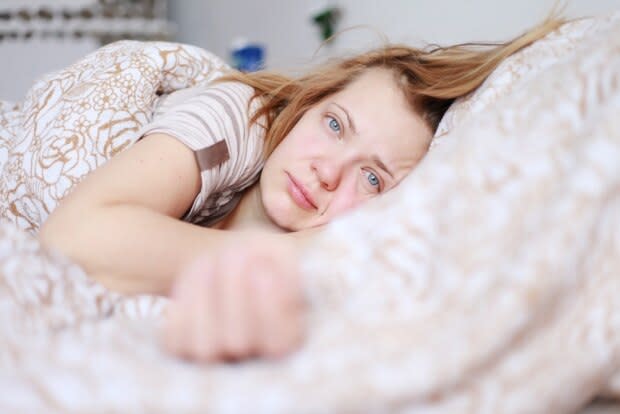About 30% of Canadians suffer from a sleep disorder — and less is known about women's insomnia
Frustration: that's the word Vancouverite Jacqueline Sinclair uses most often to describe her insomnia.
There's the frustration of lying in bed, awake in the middle of the night, knowing how crappy she'll feel the next day. The frustration of struggling to relax as she lies awake. And the frustration of failing at what should be a basic life skill.
"Knowing that the rest of the world is able to do something as simple as sleep ... it's frustrating," said Sinclair, 50, who works from home doing administration for the family's construction business.
Sleep has eluded Sinclair for the past 10 years. As remedies, she has cut out caffeine, sugar and gluten. She has tried herbal teas, homeopathy and vitamins. CBD oil and prescription sleeping pills have been helpful, but they each had worrisome side effects.
"I'm not sure what's next," she said. "I hope I go to bed tonight and sleep for six hours straight. Wouldn't that be fantastic?"

Dr. Ram Randhawa, a psychiatrist at the University of British Columbia's Sleep Disorders Program, says about 30 per cent of Canadians struggle with getting to or staying sleep at any given time. The prevalence of insomnia does seem to be higher among women, he said.
For most people, sleep issues are a temporary problem brought on by stress or worry. For some, they can be a debilitating, life-long problem.
Increasingly, doctors and sleep experts recognize that insomnia and other sleep disorders affect women and men differently. At the World Sleep Congress in Vancouver this week, women and sleep is one of a handful of key topics.
Dr. Ghada Bourjeily, a professor of medicine at Brown University in Rhode Island and chair of the course on sleep health for women at the conference, says women have historically been underrepresented in medical research, including research on sleep disorders.

Women face unique biological circumstances that can disrupt sleep at different times in their lives, Bourjeily says — beginning when they get their periods, to when they become pregnant and eventually go through menopause.
"There's a lot that we seem to be learning about these things," she said.
Deeper understanding
Randhawa, with UBC's Sleep Disorders Program, will also be presenting at the conference.
He says UBC's sleep clinic has a long wait list of people eager to get help, and many of them are women who have trouble falling or staying asleep.
He agrees that sleep issues manifest differently in men and women. While sleep apnea is more likely to affect men, for example, women are more prone to conditions that can affect sleep like restless leg syndrome, anxiety and depression.

Randhawa says it's important for doctors to develop a well-rounded profile of a patient's circumstances and the problems they face, including family pressures like child-rearing and housework.
"If I can develop a better understanding of that particular person's issue of what it is that they are struggling with, and how that has affected them, that will allow me to help them better," he said.
Randhawa says women who attend his clinic can also request one of three female psychiatrists who work there, if they prefer someone they think might be more understanding of their situation.
Validating patients' concerns
Lianne Tomfohr-Madsen, an associate professor of psychology at the University of Calgary who will present her research on insomnia and pregnancy at the congress, says some doctors can be dismissive of women's sleep issues.
Tomfohr-Madsen is working to help doctors differentiate between normal sleep disturbances during pregnancy, like physical discomfort and frequent nighttime urination, from more serious issues.
"We often aren't differentiating what those normal changes look like from what's actually really clinically significant and bothersome to women," she said

Some pregnant women feel disregarded when they discuss their sleep issues with their doctor, Tomfohr-Madsen says, and that may lead them to seek remedies through alternative medicine or over-the-counter medication that could be harmful to their unborn child.
Tomfohr-Madsen advises doctors to not dismiss their patient's concerns and focus on finding solutions, of which she says there are many.
"People often know that their sleep is a problem," she said. "We want to validate that this isn't something normal, and it's a problem, and that it's something that we can work on."


